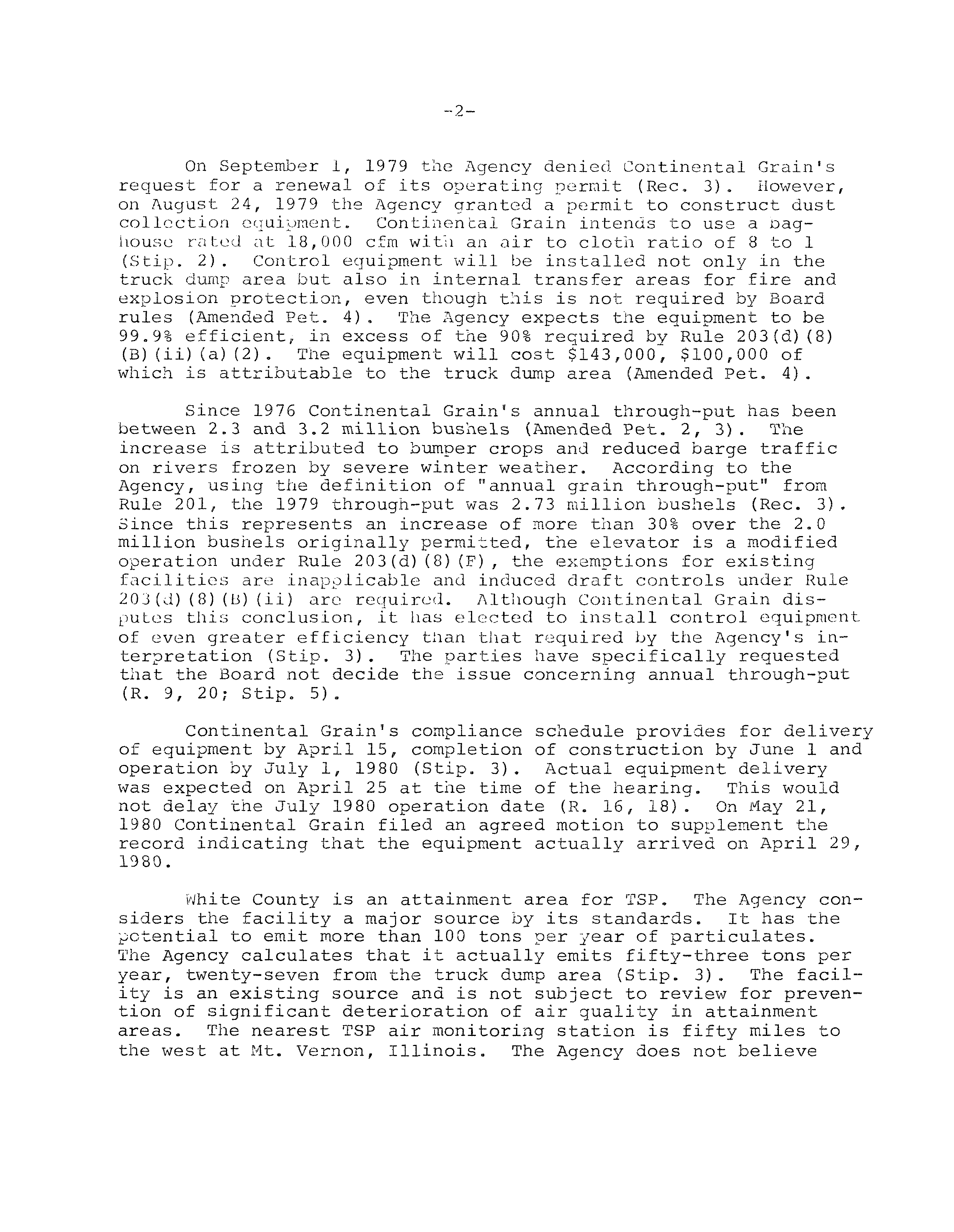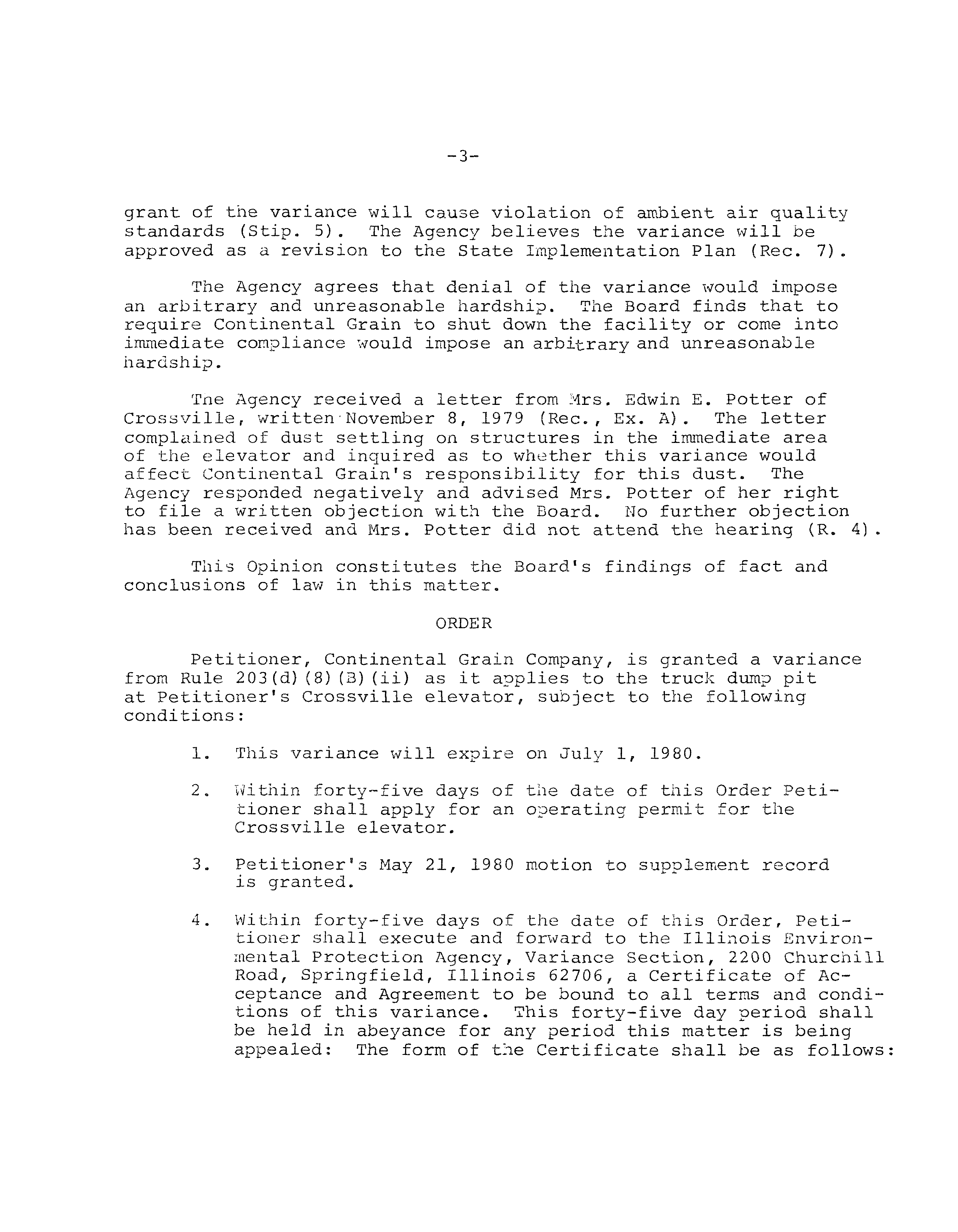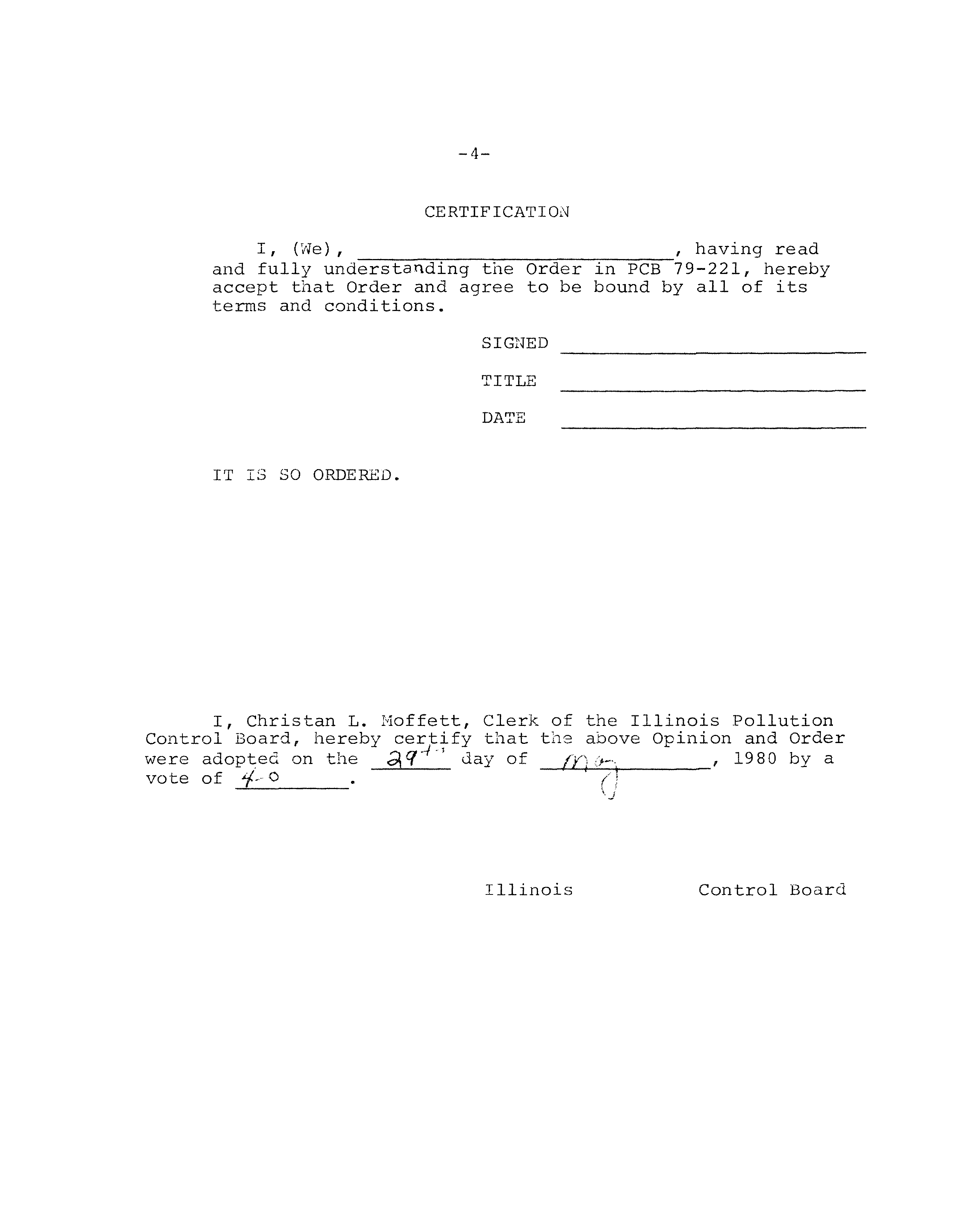ILLINOIS POLLUTION CONTROL BOARD
May 29,
1980
CONTINENTAL
GRAIN
COMPANY,
Petitioner,
PCB 79—221
ENVIRONMENTAL
PROTECTION
AGENCY,
Respondent.
OPINION
~ND
ORDER
OF THE BOARD
(by D.
Satcheli):
This matter comes before the Board upon a petition and amended
petition for variance filed October 19 and December
4,
1979 by
Continental Grain Company
(Continental Grain).
The amended peti-
tion requests a variance through June,
1980 from the requirements
of Rule 203(d) (8) (B)* of Chapter
2:
Air Pollution Control Regula-
tions which relate to the requirement of induced draft equipment
for control of total suspended particulate
(TSP)
emissions from
grain elevators,
On January
18,
1980
the
Environmental Protection
Agency
(Agency)
recommended that the variances be granted with
conditions.
A public hearing was held
in Carmi on April 24,
1980
at which time the parties presented
a stipulation of fact
(Joint
Ex.
1)
-
~o members of the public attended,
although written com-
ment was received from
a Mrs.
Edwin E.
Potter.
Continental Grain operates a grain elevator in Crossville,
White County.
The town has a population of 850.
The elevator is
located just south of town, northwest of Illinois Route
1,
about
300 feet from the nearest residence
(Rec.,
Ex.
C)
.
It is a point—
of—origin elevator which receives grain from area farmers
for
transshipment by truck to Continental Grain~sterminal elevator in
Mt. Vernon, Indiana.
It receives grain by way of two truck dump
pits within the same enclosure.
The enclosure
is equipped with
quick closing doors
to limit particulate emissions during dumping.
Apparently this
is the only air pollution control equipment at this
elevator.
At one time the Agency issued
an operating permit for
the facility even though it lacked induced draft controls required
by Rule 203(d) (8) (B) (ii)
.
Since
it was
an existing facility hand-
ling not more than 2,000,000 bushels annually and located outside
a major population area,
it was exempt under Rule 203(d) (8) (D),
*The pleadings actually refer to Rule 203(d) (9) which has recently
been renumbered and is now Rule 203(d) (8).
—2—
On September
1, 1979 the Agency denied Continental Grain’s
request for a renewal of its operating permit
(Rec.
3).
However,
on August 24,
1979 the Agency granted a permit to construct dust
collection equipment.
Continental Grain intends to use a bag—
house rated at 18,000 cfm with an air to cloth ratio of
8 to 1
(Stip. 2).
Control equipment will be installed not only in the
truck dump area but also in internal transfer areas for fire
and
explosion protection, even though this is not required by Board
rules
(Amended
Pet.
4).
The Agency expects the equipment to be
99.9
efficient1
in
excess
of
the
90
required
by
Rule 203(d) (8)
(B) (ii) (a) (2).
The
equipment
will cost $143,000, $100,000 of
which is attributable to the truck dump area (Amended
Pet.
4).
Since
1976 Continental Grain’s annual through-put has been
between 2.3
and
3.2 million bushels
(Amended
Pet.
2,
3).
The
increase is attributed to bumper crops
and
reduced
barge
traffic
on rivers frozen by severe winter weather.
According to the
Agency, using the definition of “annual grain through-put” from
Rule 201,
the 1979 through—put was 2.73 million bushels
(1ec.
3).
Since this represents an increase of more
than
30
over the 2.0
million bushels originally permitted, the elevator is a modified
operation under Rule 203(d) (8) (F), the exemptions for existing
facilities are inapplicable and induced draft controls under Rule
203(d) (8) (8) (ii)
arc required.
Although Continental Grain dis-
putes this conclusion, it has elected to install control equipment
of even greater efficiency
than
that required by the Agency’s in-
terpretation
(Stip.
3).
The parties have specifically requested
that the Board not decide the issue concerning annual through-put
(R.
9, 20; Stip.
5).
Continental Grain’s compliance schedule provides for delivery
of
equipment
by April 15, completion of construction by June 1 and
operation
by
July
1,
1980
(Stip.
3).
Actual
equipment
delivery
was expected on April 25 at the time of the hearing.
This would
not delay the July 1980 operation date
(R. 16, 18).
On May 21,
1980 Continental Grain filed an agreed motion to supplement the
record indicating that the equipment actually arrived on April 29,
1980.
White County is an
attainment
area
for
TSP.
The
Agency
con-
siders
the facility a major source by its standards.
It has the
potential to
emit
more than 100 tons per year of particulates.
The Agency calculates that it actually emits fifty-three tons per
year,
twenty-seven from the truck dump area (Stip.
3).
The facil-
ity is an existing source
and
is not subject to review for preven-
tion
of
significant
deterioration
of
air
quality
in
attainment
areas.
The
nearest
TSP
air
monitoring
station is fifty miles to
the west at Mt. Vernon, Illinois.
The
Agency
does
not
believe
—3—
grant of the variance will cause violation of ambient air quality
standards
(Stip.
5).
The Agency believes the variance will be
approved as a revision to the State Implementation Plan
(Rec.
7).
The Agency agrees that denial of
the
variance
would impose
an
arbitrary
and
unreasonable
hardship.
The
Board
finds
that
to
require
Continental
Grain
to shut down the facility or come into
immediate
compliance
would
impose
an
arbitrary
and
unreasonable
hardship.
The
Agency
received
a
letter
from
Mrs.
Edwin
B.
Potter
of
Crossville, writtenNovember
8,
1979
(Rec.,
Ex.
A).
The
letter
complained of dust settling on structures
in the immediate area
of the elevator and inquired as
to whether
this variance would
affect Continental Grain’s responsibility
for this dust.
The
Agency responded negatively and advised Mrs.
Potter of her right
to file a written objection with the Board.
No further objection
has been received and Mrs.
Potter did not attend the hearing
(R.
4)
This Opinion constitutes the Board’s findings
of fact and
conclusions
of
law
in
this
matter.
ORDER
Petitioner,
Continental Grain Company,
is granted a variance
from Rule 203(d) (8) (3) (ii)
as
it aoplies to the truck dump pit
at Petitioner’s Crossville elevator,
subject
to the following
conditions:
1.
This variance will expire on July
1,
1980.
2.
Within forty—five days of the date of this Order Peti-
tioner shall apply
for an operating permit for the
Crossville elevator.
3.
Petitioner’s May 21,
1980 motion to supplement record
is
granted.
4.
Within forty—five days of the
date
of
this
Order, Peti-
tioner shall execute and forward
to the Illinois Environ—
mental Protection Agency, Variance Section,
2200 Churchill
Road,
Springfield,
Illinois 62706, a Certificate of Ac-
ceptance and Agreement to be bound to all terms and condi-
tions of this variance.
This forty-five day period shall
be
held
in
abeyance
for
any
period
this
matter
is
being
appealed:
The form of the Certificate shall be
as follows:
—4—
CERTIFICATION
I,
(We),
___________________________,
having read
and
fully
understanding
the
Order
in
PCB
79-221,
hereby
accept
that
Order
and
agree
to
be
bound
by
all
of
its
terms
and
conditions.
IT
IS
SO
ORDERED
SIGNED
TITLE
DATE
I, Christan
L. Moffett, Clerk of the Illinois Pollution
Control Board,
hereby certify that the above Opinion and Order
were adopted
on the
______
day of
_____________,
1980
by
a
vote
of
‘~O
-
()
Illinois
Control Board





